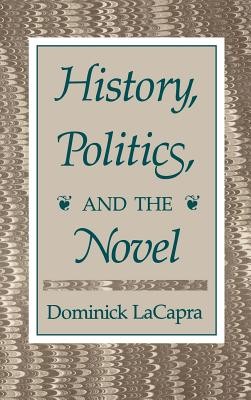
- We will send in 10–14 business days.
- Author: Dominick Lacapra
- Publisher: Cornell University Press
- ISBN-10: 0801420334
- ISBN-13: 9780801420337
- Format: 15.2 x 22.9 x 1.8 cm, kieti viršeliai
- Language: English
- SAVE -10% with code: EXTRA
Reviews
Description
Although history was once considered a component of the study of literature, the two fields have grown steadily apart since the sixteenth century. Today few literary theorists and critics study history, and even fewer historians follow the work of their colleagues in literature departments; instead, historians continue to interpret the novel as literary critics and theorists did several decades ago. Dominick LaCapra, an intellectual historian well versed in literary theory and methodology, here addresses the complex role of the novel in history and criticism, seeking to establish a few guiding principles for the study of the historicity of literature.
LaCapra provides historically informed readings of eight major modern novels: Stendhal's Red and Black, Dostoevsky's Notes from Underground, Eliot's Middle-march, Flaubert's Sentimental Education, Mann's Death in Venice and Doctor Faustus, Woolf's To the Lighthouse, and Gaddis's The Recognitions. In each reading, he explores the question of how the text relates to its historical and literary contexts in symptomatic, critical, and possibly transformative ways. Eschewing both a narrow "intratextual" formalism and a reductive "extratextual" historicism, he attempts to motivate the very selection of relevant contexts for reading by drawing attention to the intellectual and sociopolitical import of our exchange with the past. Throughout, LaCapra consciously emulates the discursive strategy of these novels, thereby reinforcing his assertion that historians have much to learn from modes of discourse they have hitherto viewed as mere documentary symptoms of the past.
The work of a knowledgeable and discerning scholar, this bold attempt to create a more engaging dialogue between the past and present will be stimulating reading for intellectual historians and literary theorists.
EXTRA 10 % discount with code: EXTRA
The promotion ends in 22d.20:56:28
The discount code is valid when purchasing from 10 €. Discounts do not stack.
- Author: Dominick Lacapra
- Publisher: Cornell University Press
- ISBN-10: 0801420334
- ISBN-13: 9780801420337
- Format: 15.2 x 22.9 x 1.8 cm, kieti viršeliai
- Language: English English
Although history was once considered a component of the study of literature, the two fields have grown steadily apart since the sixteenth century. Today few literary theorists and critics study history, and even fewer historians follow the work of their colleagues in literature departments; instead, historians continue to interpret the novel as literary critics and theorists did several decades ago. Dominick LaCapra, an intellectual historian well versed in literary theory and methodology, here addresses the complex role of the novel in history and criticism, seeking to establish a few guiding principles for the study of the historicity of literature.
LaCapra provides historically informed readings of eight major modern novels: Stendhal's Red and Black, Dostoevsky's Notes from Underground, Eliot's Middle-march, Flaubert's Sentimental Education, Mann's Death in Venice and Doctor Faustus, Woolf's To the Lighthouse, and Gaddis's The Recognitions. In each reading, he explores the question of how the text relates to its historical and literary contexts in symptomatic, critical, and possibly transformative ways. Eschewing both a narrow "intratextual" formalism and a reductive "extratextual" historicism, he attempts to motivate the very selection of relevant contexts for reading by drawing attention to the intellectual and sociopolitical import of our exchange with the past. Throughout, LaCapra consciously emulates the discursive strategy of these novels, thereby reinforcing his assertion that historians have much to learn from modes of discourse they have hitherto viewed as mere documentary symptoms of the past.
The work of a knowledgeable and discerning scholar, this bold attempt to create a more engaging dialogue between the past and present will be stimulating reading for intellectual historians and literary theorists.


Reviews